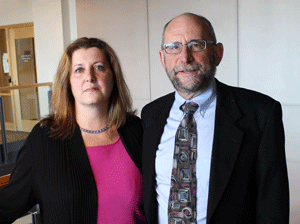Monica Coenraads holds a master of business administration degree in international finance, but it’s the world of science in which she’s known as an inspirational leader.
Ever since daughter Chelsea, 18, was diagnosed with a rare and debilitating neurological disease called Rett syndrome as a toddler, Coenraads has dedicated her life to speeding up the research process to find—and fund—a cure. As co-founder and executive director of Rett Syndrome Research Trust, this mother of three and former restaurateur studies the latest research developments into the disease; identifies top scientists working on bold, novel ideas; finds ways for them to work together; and helps to fund their research.
 |
|
| Rett syndrome researcher Michael Green, pictured here with Monica Coenraads, said the support from RSRT makes a significant difference in his lab. |
UMass Medical School Chancellor Michael F. Collins will award an honorary Doctor of Science degree to Coenraads at Commencement on May 31 for her tireless work and passionate advocacy. Chancellor Collins said she is an inspiration to those in the field, which includes UMass Medical School’s Michael R. Green, MD, PhD, whose work aimed at reversing the underlying cause of Rett is funded by RSRT. Dr. Green is a Howard Hughes Medical Institute Investigator, the Lambi and Sarah Adams Chair in Genetic Research and chair and professor of molecular, cell & cancer biology.
“Monica Coenraads leads one of the most impressive and influential research support programs in the world,” Chancellor Collins said. “The focus and energy she brings to the field motivates scientists and sparks discoveries. She has helped raise more than $41 million to fund bold research and is credited with supporting significant breakthroughs.”
Coenraads explained her philosophy in a blog on the RSRT website.
“Before Rett entered my life, I assumed that academic scientists, industry and government worked together seamlessly to discover effective therapies for the horrible ailments that afflict us,” Coenraads explained. “Nothing could be further from the truth. There is no ‘Department of Cures.’ Laboratory breakthroughs don’t naturally bubble up and become drugs. The reality is that progress must be relentlessly driven, managed, nurtured and prodded, not to mention funded. It’s a messy, difficult and expensive process that can be slowed and derailed by a multitude of hurdles.
“Disease-specific organizations such as RSRT cannot afford to be spectators, passively reviewing proposals and granting money,” she said. “It is incumbent on us to set the research agenda and to facilitate its execution while staying nimble and vigilant to new opportunities.”
Coenraads’ work began in 1998 when Chelsea was diagnosed with the disease. A year later, Coenraads co-founded the Rett Syndrome Research Foundation (RSRF), leading the drive to stimulate scientific interest and research in Rett syndrome, culminating with the groundbreaking work in 2007 that demonstrated the first global reversal of symptoms in preclinical models of the disorder. In 2008, Coenraads helped launch RSRT.
“Being recognized at Commencement and getting an honorary degree is an indescribable honor for me,” said Coenraads, who lives in Trumbull, Conn., with her husband, Pieter, sons Alex and Tyler, and Chelsea. “Thinking back, when I was in college, I always wanted to go to medical school. I chose another route and now here I am getting a degree. It means a huge amount. I also hope that it helps to elevate the profile of Rett syndrome and that more people will learn about it. That’s very important as well.”
Dr. Green said the support from RSRT makes a significant difference in his lab.
“With NIH funding, you pretty much have to be doing mainstream research,” Green said. “The NIH doesn’t fund bold and innovative projects often. By contrast, organizations like RSRT are willing to take on high-risk projects that have controversial hypotheses and rationales, because these are the ones that really may have a great impact on disease.”
Related links on UMassMedNow:
IOM president, Ebola health care workers and Rett Syndrome advocate to be honored at UMass Medical School Commencement
UMMS scientist aiding a mother’s quest for rare disease cure